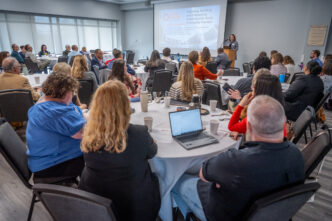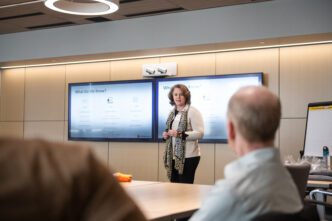As we come to the close of the fall semester and 2024, I was thinking about all that we’ve accomplished to advance well-being at Clemson. I am filled with a deep sense of resolve, joy and excitement for what’s to come. I love being a chief well-being officer and nothing gives me more satisfaction than working with people and communities to advance health and wellness. It’s a job I take very seriously. So, when a young student named Kara Geantasio reached out to me last spring to tell me she wanted to be a chief well-being officer one day, I offered her the opportunity to intern this fall. It has been a serendipitous opportunity for both of us. I never fail to grow and learn when working with students, and I think Kara would say she has learned a great deal working with me as well. I asked her to write the CWO blog this month to share what she’s learned, what the experience meant for her and how she thinks about well-being now after working with me. Please enjoy Kara’s story; she’s an amazing young woman and will indeed be a great CWO one day. — Anna
The role of a student is an all-encompassing job title. It doesn’t matter if you are a freshman, a graduate student, a commuter or a student-athlete — being a student is a juggling act of coursework, extracurriculars, jobs/internships and learning how to ‘adult’ in the real world. It can be difficult to stay on top of these duties, while also having fun and enjoying your college experience. But one thing that has helped me not only survive but also thrive in my last semester at Clemson is focusing on my whole holistic well-being.
As an undergraduate student, I wondered if there were ways to make this time of our lives a little easier. I’ve tried setting up workout plans for the semester, meal-prepping for the week and other wellness activities over the course of my time at Clemson. However, no matter what ‘plan’ I set for myself, it would always unravel at some point in the semester. I would follow it for a while and eventually I would be slammed with exams back-to-back and because I was studying, I wouldn’t have time to meal-prep. So then, on my way to study I would probably pick up some Chick-fil-A to cheer me up and then would nix my workout, either because I was too mentally tired from studying, or because the CFA sat heavy in my stomach. When the rain fell, it poured. I would end up feeling defeated and exhausted after a busy week, whereas the previous weekend, I felt super healthy. This snowball effect is easy to fall into when life gets in the way, but this cycle impacts you more than you may realize.
Not only would the fast-food meal start a downward spiral on my diet, it also did not fit into my budget. And skipping the workout would be fine for a couple of days, but once I stopped, it was hard to start up again. The sedentary lifestyle would make it harder to sleep, which would in turn make me too tired to do well on my exam or participate in all the fun things I enjoy. It took until my very last semester of college to realize that the only true way to a healthy lifestyle is filling up all eight interdependent dimensions of our health.
In my internship with Clemson’s CWO, Dr. Anna Courie, I have learned that our wellness consists of emotional, environmental, financial, intellectual, occupational, physical, social and spiritual dimensions. Just focusing on working out or eating healthy is not enough to make us well individuals. Suddenly it made sense why my plans didn’t work. Unless I was filling my cup in all eight areas, I was going to have some spillage. Since each of these dimensions have a sense of dependency on each other, there is no way to be a fully healthy individual without working on personal growth in each area.
Finding time in my schedule to work on these dimensions has been a process, but it is finally one that has stuck through the busy weeks. I put more emphasis on areas I was avoiding before, such as spiritual and financial dimensions. As it turns out, they were creating a lot of unconscious stress. Once I started to grow in these areas, I felt more full as a person. I was finally able to attend all of my commitments, spend my time wisely and not break down whenever something unexpected came my way. And the more I work on one, it becomes easier to work on the others. Eating well makes my mind clear, which improves my grades. Budgeting helps me afford fun things with friends, which then improves my social life. My environment is now a full reflection of who I admire and want to be. If you can implement just a little bit of wellness into your daily activities, it will be less stressful and overwhelming and will not feel like another task or chore to check off the list. You will slowly start to transform into better health, happiness and connection.
Well-being is not just a physically fit individual or someone without any anxiety or depression. Well-being means gratefulness. Connection. Relationships. Feeling full. Service and being there for others. I wish I had learned this in my earlier years at Clemson, but I’m glad to be leaving with this knowledge. You cannot be the best version of yourself to others, without first being there for yourself. Fill your cup, so you can fill others’ too!







